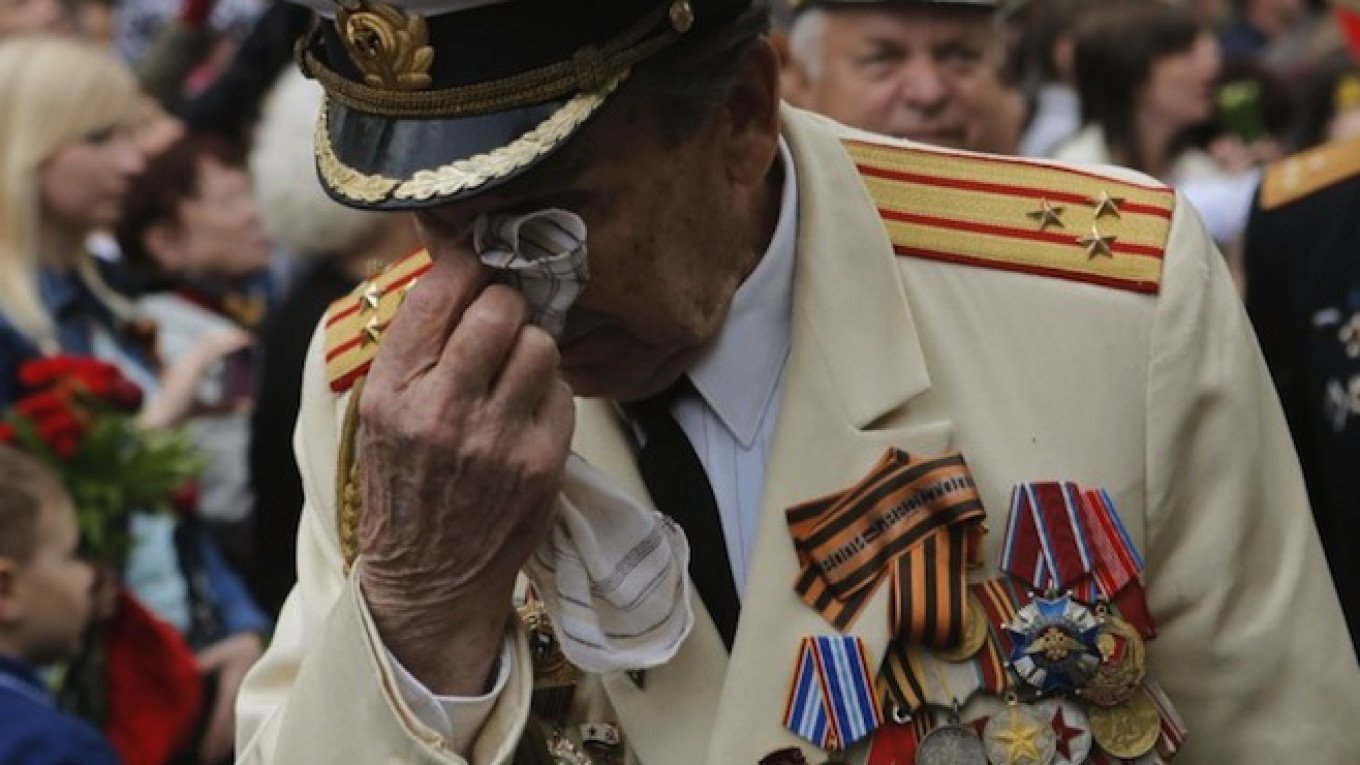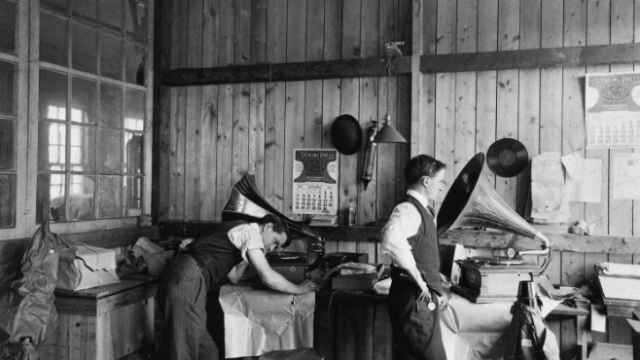Russia will commemorate 70 years since the Allied victory over Nazi Germany this Saturday, May 9. The day will be marked by a huge parade through the center of Moscow, involving some 200 military vehicles along with 150 aircraft.
Another way in which Russian people remember the Great Patriotic War is through songs. In the run-up to Saturday, The Moscow Times has compiled a list of the most popular military songs.
1. Cranes / Zhuravli
"It sometimes seems to me that all the soldiers,
Who never returned from bloody battlefields,
Do not lie in the ground where they fell,
But turned into white cranes."
For the full lyrics (in Russian) click here.
This famous song performed by Soviet actor and singer Mark Bernes originally came from a poem by Dagestani poet Rasul Gamzatov, who wrote it in his native Avar language in 1968.
The text was translated into Russian by poet-translator Naum Grebnev and published in the "Novy Mir" (New World) literary magazine later that same year.
After reading the poem, Bernes phoned Grebnev and together they adapted the lyrics for a song that they dedicated to the soldiers who died during the Great Patriotic War.
2. Dark Is The Night / Tyomnaya Noch
"Dark is the night, only bullets whistle in the steppe,
Only wind wails through the wires, stars dimly twinkle.
In this dark night, I know that you, darling, cannot sleep
And secretly wipe your tears away near the crib."
For the full lyrics (in Russian) click here.
The song was originally performed by Mark Bernes in the 1943 war film "Two Soldiers."
In the film, Bernes plays a soldier who thinks about his wife and young baby at night while singing "Dark Is The Night."
A Polish version of the song was popularized by singer Vera Gran in the 1960s and can be found here.
3. Oh, The Roads... / Ekh, Dorogi...
"Oh, the roads… dust and fog,
Cold, dismay, and wild grass of the steppe…
Shot will breaks out, raven circling,
Your friend in the wild grass is lying lifeless."
For the full lyrics (in Russian) click here.
The song was written a few months after the Great Patriotic War ended by Soviet composer and conductor Anatoly Novikov, with lyrics supplied by Lev Oshanin.
Director Sergei Yutkevich had commissioned the song for a theatrical performance on November 7 called "Victorious Spring," which is where "Oh, the Roads…" was first performed to the public.
"Oh, The Roads" recalls the hardships that the population experienced and endured throughout the course of the war.
4. Katyusha
Let him remember an ordinary girl,
And let him hear how she sings,
Let him take care of the Motherland,
As Katyusha will take care of their love.
For the full lyrics (in Russian) click here.
"Katyusha" was composed in 1938 and was first performed by Soviet jazz singer Valentina Batishcheva. The song became popular during the Great Patriotic War, inspiring people to defend their land from the enemy.
The song tells the story of a young woman, called Katyusha, who longs for her beloved — a soldier, who is serving to protect the motherland.
It is now popular among football fans of the Spartak Moscow football club as well as the Russian national team.
5. Dark-Skinned Girl / Smuglyanka
"The dark-skinned Moldovan girl went by path to the forest,
I was aggrieved to see that she did not call me with her.
I often thought of the dark-skinned Moldovan girl at nights,
And suddenly I met my dark-skinned girl in the partisan squad."
For the full lyrics (in Russian) click here.
Written in 1940 by poet Yakov Shvedov and composer Anatoly Novikov, the song was intended to glorify the female partisans of the Russian Civil War in 1917-1922. The song tells of how a man falls in love with a young Moldovan woman, who convinces him to join the partisan movement.
"Smuglyanka" was at first considered to be too light-hearted and so it wasn't performed anywhere for several years. Its first official performance came in 1944, at the Tchaikovsky Concert Hall in Moscow.
The song later appeared in a Soviet film about love, life and death called "Only 'Old Men' Are Going to Battle." The movie was watched by more than 44 million Soviet people, and "Smuglyanka" was soon popularized throughout the whole Soviet Union, becoming an essential part of Russian folk music.
6. Sacred War / Svyashchennaya Voina (also known as "Vstavai, Strana Ogromnaya!" (Arise, the Great Country!)
"Black wings don't dare
To fly over our Motherland!
Over its spacious fields
The enemy doesn't dare to trample!"
For the full lyrics (in Russian) click here.
This song, which was performed by the Alexandrov Ensemble, was viewed unofficially as the Soviet Union's wartime anthem. Notably, Alexander Alexandrov — the ensemble's leader — also wrote the score of the official Soviet national anthem, which has since become Russia's national anthem.
"Sacred War" became a favorite among the troops, likely due to the fact that it highlighted the courage and daring of Soviet forces. It gained steam later in the war, as in the early phases it was seen as too dark and foreboding — a song that envisioned a long, tumultuous fight against the "dark fascist forces" rather than an expeditious victory.
As the Nazi forces closed in on Moscow, capturing the relatively close cities of Kaluga, Rzhev and Kalinin, "Sacred War" was played each morning on the All-Union Radio. Popular folklore has it that this song boosted the Soviet forces' spirits, thereby propelling them toward victory.
7. Victory Day / Den Pobedy
"Hello Mom, not all of us have returned...
How I wish to run barefoot in the dew!
We have trekked across half of Europe, half of the Earth,
We did all we could to hasten this day."
For the full lyrics (in Russian) click here.
This song, penned by poet Vladimir Kharitonov and composer David Tukhmanov, was written as an entry in a song competition ahead of the 30th anniversary of the defeat of Nazi Germany. The judges were unimpressed, decrying the lyrics as inappropriately light and too frivolous for such a meaningful occasion.
They complained that the melody was reminiscent of something you would dance the tango or the foxtrot to. Both of those dances had been banned from the Soviet Union for being too bourgeois.
But beyond the judges' panel, the song quickly gained popularity. It has since become one of the most popular songs extolling the virtues of the Soviet army.
A Message from The Moscow Times:
Dear readers,
We are facing unprecedented challenges. Russia's Prosecutor General's Office has designated The Moscow Times as an "undesirable" organization, criminalizing our work and putting our staff at risk of prosecution. This follows our earlier unjust labeling as a "foreign agent."
These actions are direct attempts to silence independent journalism in Russia. The authorities claim our work "discredits the decisions of the Russian leadership." We see things differently: we strive to provide accurate, unbiased reporting on Russia.
We, the journalists of The Moscow Times, refuse to be silenced. But to continue our work, we need your help.
Your support, no matter how small, makes a world of difference. If you can, please support us monthly starting from just $2. It's quick to set up, and every contribution makes a significant impact.
By supporting The Moscow Times, you're defending open, independent journalism in the face of repression. Thank you for standing with us.
Remind me later.






